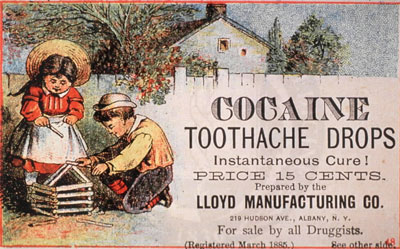Ask any druggie who knows his history (they're not as rare as you think) what year he would like to time travel to. I guarantee that the 1800s will be in the top three responses. Aside from the puritans and social reformers lambasting drunkards and denouncing alcohol, a minor cold would grant you access to at least a shot of some opiates. The question is not what was available, it's what wasn't available. Coke, heroine, opium, morphine, quaaludes, cigarettes (what could bogeys cure? Asthma of course!), alcohol, chloroform, marijuana, soda, amphetamines, barbiturates, and various other quack remedies could be had over the counter (I miss the good ole days). Most of these drugs are now illegal.
The "miracle drug"s heyday in the 1800s saw it prescribed by the country's best physicians for exhaustion, depression, and morphine addiction. It was also available in many patent medicines. Come to think of it, from what we know of the coca leaf and cocaine, it would definitely work to alleviate exhaustion and depression. We should look into getting that back into drugstores. It can't be much worse than what is already sold at your local CVS.
Every manufacturer wanted to hop on the cocaine bandwagon during this time. Italian doctor Paolo Mantegazza went to Peru in 1859, witnessed the natives chewing coca leaves, and of course had to try it himself. You'd do the same thing. He wrote a paper on the coca leaf describing its effects which was later read by a French chemist by the name of Angelo Mariani.
in 1863 Mariani began selling Vin Mariani Wine which had been treated with coca leaves.
The bandwagon continued to grow into the 1880's as Frederick Allen created the now renowned soft drink Coca-Cola. It is said to have contained a "pinch" of coca leaf. No wonder people liked it so much.
Also in 1885 manufacturer Parke-Davis (once America's oldest and largest drug maker) sold cocaine cigarettes, power, and injections. The company claimed that their coke products would "supply the place of food, make the coward brave, the silent eloquent, and render the sufferer insensitive to pain." "Oh really? We've known this for over 3,000 years," said the Bolivian slave.
The father of psychoanalysis Sigmund Freud was an early advocate for cocaine, believing that it was a safe and useful tonic that could cure depression and sexual impotence (boy was he right). So what Freud may have been a coke-head? Who wasn't back then? Thomas Edison also promoted cocaine use during his day.
The wonder drug's time in medicinal substances and carbonated drinks was relatively short lived as scientists and physicians finally discovered that this shit was kinda unhealthy. By the 1920s there were enough regulations to halt the use of cocaine in medicine, effectively protecting the public from partying too much. Damn government, always tryna stop us from having a good time.
Until next time. Peace and Coke... I mean, "Love."


No comments:
Post a Comment